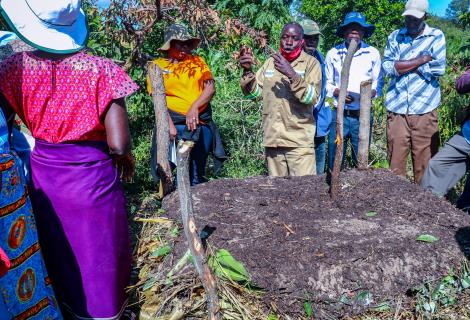Calls to Prioritise Support to Agriculture Extension Services to Ensure Food Security in Zimbabwe.

Press Statement
Harare -23 June 2022 – ActionAid Zimbabwe (AAZ) joins the rest of the world in commemorating the Public Service Day, themed, “Building back better from COVID-19: Enhancing innovative partnerships to meet the Sustainable Development Goals (SDGs).” On this day and guided by our climate justice campaign, AAZ calls upon the Government of Zimbabwe (GoZ) to ensure its policies, resources and priorities are being channelled towards extension services support for the country to be food secure in the face of climate change and an economic crisis. As we observe the Public Service Day against a background of droughts, cyclones, and floods in Zimbabwe, we are reminded that agriculture extension is a critical public service that provides support services to farmers and helps the country meet the United Nations SDG Goal 2 of Zero Hunger by 2030.
The Public Service Day recognizes that democracy and successful governance are built on the foundation of a competent civil service, hence the value and contribution of public service in the development process should be upheld by recognising the work of public servants and encouraging women and young people to pursue careers in the public sector. For Zimbabwe to deal with a looming food crisis, addressing the issue of decent working conditions for public sector workers and investing in continuous professional development for agriculture sector workers should be prioritised by the Government. A motivated agriculture extension worker will contribute to quality service delivery to smallholder farmers (SHFs), the bulk of whom are women and youth who are vulnerable to economic and climate shocks and have limited capacity to adapt to the impacts of climate change.
As we take stock of the GoZ capacity to provide public services, AAZ has noted low wages and poor working conditions in the public sector negatively demoralising public workers affecting their provision of quality gender-responsive public services (GRPS). The low wages affect the ability and motivation of public sector workers to provide decent living standards for their families. Agriculture extension workers experience limited operational resources like transport to reach farmers, lack of appropriate technology and in-service training for agriculture practices such as agroecology which are alternatives to addressing food insecurity because of climate change. Adequate technical and financial support is therefore important in ensuring sustained productivity of the SHFs whose livelihoods depend on agriculture. Hence any Government policy should seek to address the effects of climate change on SHF in relation to other productivity problems that farmers face. Chief among these policies is the need to have effective agriculture extension support, including services that meet farmers’ needs on green alternatives such as agroecology. In addition, extension services should be gender-responsive and meet the needs of specific groups such as women and youth, persons with disabilities and other marginalised groups.
Access to quality advisory services in agricultural production is important in all relevant segments of the food system. There is a need for the government to strengthen the public agricultural advisory system and encourage private sector participation in agricultural information sharing to food system actors and leverage appropriate digital (IC) technology to improve the provision of inclusive agricultural advisory services.
AAZ appreciates the GoZ efforts in providing extension workers with smartphones aimed at providing improved extension and advisory services through digital ways as part of COVID-19 Response. However, more resources should be set aside for airtime for the extension workers to effectively use the digital tools provided. The GoZ should also invest in providing agroecology skills to agriculture extension workers to meet the UN SDG Goal 2 of zero hunger by 2030. AAZ acknowledges the efforts by the Government in supporting agroecology as it aims to improve food security following climate-induced droughts. AAZ, therefore, calls on GoZ to consider the following recommendations:
1. To improve budget allocations for the agriculture sector and continuously review the remuneration of civil servants responding to macroeconomic fundamentals.
2. Decentralise budgetary utilisation to provincial structures for the motorization and equipping of extension officers to adopt e-extension.
3. Adopt the progressive taxation model to fund agriculture and other key sectors to ensure SHFs and reduce the privatisation of public services.
4. Advocate for the mobilisation of resources from climate financing from the global north and corporates to fund feminist green agriculture alternatives such as agroecology, in-service training of agriculture extension workers on agroecology
5. Finalise the Agroecology Policy and allocate adequate resources for its rollout to support smallholder farmers with a particular focus on women and youth needs.
For more details please contact: ActionAid Zimbabwe Country Director, Joy Mabenge: Email joy.mabenge@actionaid.org or Mobile +263 772904479
Twitter: https://twitter.com/ActionAidZim
Facebook: https://www.facebook.com/ActionAidZimbabwe/
Website: https://zimbabwe.actionaid.org/
ENDS//